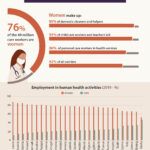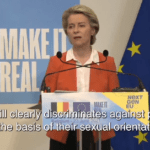There is a direct link between the unequal division of unpaid care in households and gender inequality in the labour market, according to a study by the European Institute for Gender Equality (EIGE).
Across the EU, the bulk of unpaid care work is done by women, with 92 % providing unpaid care several days a week – as opposed to 68 % of men. Employed women also do more than their fair share of unpaid care work. Across the EU, they spend 90 minutes more per day than employed men on unpaid care.
‘’The benefits of dividing care work more evenly are clear. Countries with a more equal sharing of unpaid care between women and men, tend to have higher employment rates for women and lower gender gaps in earnings,’’ said Carlien Scheele, EIGE’s Director.
Balancing the care gap
An unequal sharing of care limits women’s job prospects and is a major reason behind the gender pay gap. One way to balance the uneven sharing of unpaid care work is through the use of childcare services. EIGE’s research shows that childcare services lead to higher financial returns for women, compared to men. Women with children under 12 years using childcare services at least 14 hours a week are estimated to earn 4.8 % more on an hourly basis, compared to women who do not outsource childcare. The estimated difference for men is 2.6 %. Yet 14 % of households across the EU report unmet needs for childcare services. For half of them, it’s because of the unaffordable cost.
Gender inequality in the paid care sector
The Covid-19 pandemic has highlighted the importance of care for a well-functioning society and economy. Yet the assumption that caring is still women’s work, even when paid, contributes to its undervaluation. Currently, women make up 37 million of the 49 million care workers in the EU. Many find themselves in low paid, temporary jobs, with little career prospects.
What needs to change?
For a fairer distribution of unpaid care, we need a dual approach that would support both an equal sharing of care at the family level and accessible, quality care services. First, we need changes at the household level, so that an equal sharing of care tasks between women and men becomes the norm. Second, it is important that people have access to affordable, professional care services that can help tackle the rising care needs expected in the EU as the population ages.







Leave a Reply